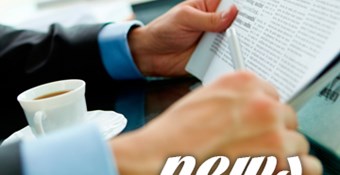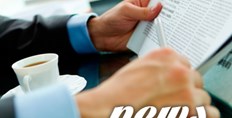Yellow Door
Americanizing the Afrikaner─── ELZETTE BOUCHER 09:19 Thu, 20 Jun 2013

Through lack of inspiration and fear of boring (to death) readers with yet another soppy story straight from the lacking love life of yours truly, Elzette Boucher shares a chance encounter with an entry from the archive - Lost in Korea...
“Waar is julle?!” This question, scribbled under a crudely drawn South African flag, remained unanswered on a commemorative wall that was erected for the two weeks of the famous Cherry Blossom Festival in Jinhae, South Korea. It was my last desperate attempt to connect with other expats, besides the colleagues I shared a flat with, after more than a year in a country where homogeneity rules.
Although many will not admit to it, it is sometimes hard to spot a South African mixed into the North American foreign majority in South Korea.
It's nearly midnight in a bedazzled pink eruption of a washroom of a Canadian pub in Ulsan, South Korea. Moments earlier I had scribbled a hopeful request for brandy on a napkin and handed it to the barman while a cover band deafeningly wailed some Foo Fighters from the stage. I had to be content with a Heineken, again, resulting in a dire need of the facilities...
As I raced past the decorative plastic daisies, I heard two American girls yammering away in one of the only two stalls. One of the stalls was clearly legitimately occupied while the other was being used for a phuza powwow. While waiting, I struck up a conversation with one of my Afrikaans colleagues to take my mind off the discomfort. Finally one of the American girls exits the stall, “Haai dis lekker om Afrikaans te hoor!” she pipes up.
I was horrified. Is this what we have become? Has working as English teachers in South Korea stripped us of our proudly South African identity and turned us into cheap American knockoffs?
About 2 000 South Africans work in South Korea, or at least that’s what some recruiting agencies would have you believe. Most of them are English teachers as the country has become somewhat of a destination of choice for those wanting to take a gap year, which has become a rite of passage for many middle-class South African youths.
I too was ‘guilty’ of this simulated language offence. In a country where you find a McDonalds and Starbucks on nearly every corner, it would be natural to expect that the dialect of choice would be American.
The private academy (hagwon) where I taught a couple of years’ ago wanted me to use an American accent when I taught. They even went as far as to ‘prohibit’ us from speaking Afrikaans in public. Initially, I expected that it would only be within the shell pink walls of the academy – which ferried droves of children back and forth between home, school and other hagwons in their Rastafarian-coloured minibuses – where this American accent would prevail. Unfortunately, it was hard to shake after hours and it took months after walking through passport control at OR Tambo to recover my native accent.
The discovery of that forgotten photograph of my crudely drawn SA flag nudged me towards the web. I had to put my mind at ease. I had to know whether more or less poorly copied facsimiles had been returning home to blue skies, rugby, biltong and boerewors. To the TweetDeck!
When South Africans in South Korea want to rally the troops, they use Facebook. So, naturally, that was my first port of call.
More than half of the South Africans who responded to the online poll I had set up said that they taught English with an American accent.
They also seemed to hold strong views about the issue - a heated debate quickly ensued.
Most did not respond to “Do you use an American accent when you teach?” with a simple “Yes” or “No”. Some said that their employers, especially at private academies, required them to ‘adopt’ American English in the classroom. Others added that their employers were satisfied with a clear, neutral accent.
A few vented about being ‘forced’ to be ‘American’, some said they blatantly refused, while one suggested that only those not comfortable with their own language competencies adopted an American accent.
Others, however, adopted “the customer is always right” approach.
Americanisation quietly creeps into your language. First it’s the A’s and you might as well be from Scotland. Then the T’s covertly transform into D’s, then the R’s roll and before you know it, it’s a full-blown accent.
While being bombarded with Z's and omitting U's all in the name of client gratification it’s easy to lose sight of the communicative competence you’re supposed to be instilling in your students.
It was Friday and time for a spelling test. I read out the words to the Grade 1s. When I received their answer sheets, water was spelt with a ‘d’. I feel terrible about my treachery.
So then what was this phenomenon? Was it purely a case of the customer is always right or did the issue run deeper than the expression of vowels?
The son of the owners of the academy that I worked at, believes that an American accent is better when it comes to speaking.
During his vacations he also taught at the academy and says he found South Africans to be very kind and willing to teach children.
This is a conundrum for many schools. They want a reliable employee who can deliver the goods. South Africans have become known for their diligence and docility but unfortunately they don’t come with the sought-after accent.
In a land of vertical syllables, language barriers stand fast and one is easily ‘lost in translation’. But the South African spirit of togetherness that is experienced when two kinsmen meet is something I have only experienced in South Korea.
One might have been pining for home-grown delights and familiar sounds and faces but back in South Africa I do miss the new-found appreciation I had for the worth of our struggle for democracy and the tolerance we cultivated along the way.
Later that morning, after my midnight encounter with the ‘American’ Afrikaner in the bathroom, I did get my brandy and coke at another bar. And while I remember how tears of joy streamed down my face as I took my first sip, it’s good to know that as South Africans we are not emulating any culture.

Although many will not admit to it, it is sometimes hard to spot a South African mixed into the North American foreign majority in South Korea.
It's nearly midnight in a bedazzled pink eruption of a washroom of a Canadian pub in Ulsan, South Korea. Moments earlier I had scribbled a hopeful request for brandy on a napkin and handed it to the barman while a cover band deafeningly wailed some Foo Fighters from the stage. I had to be content with a Heineken, again, resulting in a dire need of the facilities...
As I raced past the decorative plastic daisies, I heard two American girls yammering away in one of the only two stalls. One of the stalls was clearly legitimately occupied while the other was being used for a phuza powwow. While waiting, I struck up a conversation with one of my Afrikaans colleagues to take my mind off the discomfort. Finally one of the American girls exits the stall, “Haai dis lekker om Afrikaans te hoor!” she pipes up.
I was horrified. Is this what we have become? Has working as English teachers in South Korea stripped us of our proudly South African identity and turned us into cheap American knockoffs?
About 2 000 South Africans work in South Korea, or at least that’s what some recruiting agencies would have you believe. Most of them are English teachers as the country has become somewhat of a destination of choice for those wanting to take a gap year, which has become a rite of passage for many middle-class South African youths.
I too was ‘guilty’ of this simulated language offence. In a country where you find a McDonalds and Starbucks on nearly every corner, it would be natural to expect that the dialect of choice would be American.
The private academy (hagwon) where I taught a couple of years’ ago wanted me to use an American accent when I taught. They even went as far as to ‘prohibit’ us from speaking Afrikaans in public. Initially, I expected that it would only be within the shell pink walls of the academy – which ferried droves of children back and forth between home, school and other hagwons in their Rastafarian-coloured minibuses – where this American accent would prevail. Unfortunately, it was hard to shake after hours and it took months after walking through passport control at OR Tambo to recover my native accent.
The discovery of that forgotten photograph of my crudely drawn SA flag nudged me towards the web. I had to put my mind at ease. I had to know whether more or less poorly copied facsimiles had been returning home to blue skies, rugby, biltong and boerewors. To the TweetDeck!
When South Africans in South Korea want to rally the troops, they use Facebook. So, naturally, that was my first port of call.
More than half of the South Africans who responded to the online poll I had set up said that they taught English with an American accent.
They also seemed to hold strong views about the issue - a heated debate quickly ensued.
Most did not respond to “Do you use an American accent when you teach?” with a simple “Yes” or “No”. Some said that their employers, especially at private academies, required them to ‘adopt’ American English in the classroom. Others added that their employers were satisfied with a clear, neutral accent.
A few vented about being ‘forced’ to be ‘American’, some said they blatantly refused, while one suggested that only those not comfortable with their own language competencies adopted an American accent.
Others, however, adopted “the customer is always right” approach.
Americanisation quietly creeps into your language. First it’s the A’s and you might as well be from Scotland. Then the T’s covertly transform into D’s, then the R’s roll and before you know it, it’s a full-blown accent.
While being bombarded with Z's and omitting U's all in the name of client gratification it’s easy to lose sight of the communicative competence you’re supposed to be instilling in your students.
It was Friday and time for a spelling test. I read out the words to the Grade 1s. When I received their answer sheets, water was spelt with a ‘d’. I feel terrible about my treachery.
So then what was this phenomenon? Was it purely a case of the customer is always right or did the issue run deeper than the expression of vowels?
The son of the owners of the academy that I worked at, believes that an American accent is better when it comes to speaking.
During his vacations he also taught at the academy and says he found South Africans to be very kind and willing to teach children.
This is a conundrum for many schools. They want a reliable employee who can deliver the goods. South Africans have become known for their diligence and docility but unfortunately they don’t come with the sought-after accent.
In a land of vertical syllables, language barriers stand fast and one is easily ‘lost in translation’. But the South African spirit of togetherness that is experienced when two kinsmen meet is something I have only experienced in South Korea.
One might have been pining for home-grown delights and familiar sounds and faces but back in South Africa I do miss the new-found appreciation I had for the worth of our struggle for democracy and the tolerance we cultivated along the way.
Later that morning, after my midnight encounter with the ‘American’ Afrikaner in the bathroom, I did get my brandy and coke at another bar. And while I remember how tears of joy streamed down my face as I took my first sip, it’s good to know that as South Africans we are not emulating any culture.











